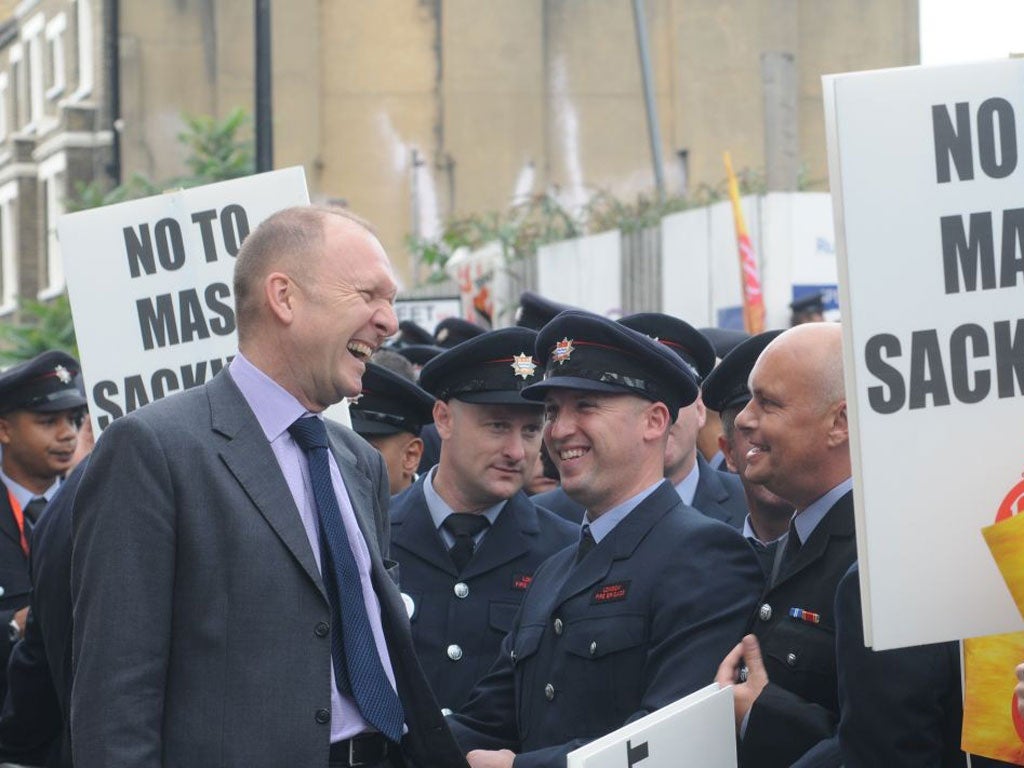
Your support helps us to tell the story
From reproductive rights to climate change to Big Tech, The Independent is on the ground when the story is developing. Whether it's investigating the financials of Elon Musk's pro-Trump PAC or producing our latest documentary, 'The A Word', which shines a light on the American women fighting for reproductive rights, we know how important it is to parse out the facts from the messaging.
At such a critical moment in US history, we need reporters on the ground. Your donation allows us to keep sending journalists to speak to both sides of the story.
The Independent is trusted by Americans across the entire political spectrum. And unlike many other quality news outlets, we choose not to lock Americans out of our reporting and analysis with paywalls. We believe quality journalism should be available to everyone, paid for by those who can afford it.
Your support makes all the difference.Mick Shaw was a firefighter by profession, but it was in fighting racism and the rise of the far right in British politics that he first made his name.
Firemen against the Nazis was founded by Shaw and others in 1978 in response to the National Front's local election successes. From then on Shaw, who went on to become President of the Fire Brigades Union, would remain a major force in the battle against the far right as he also fought to get better pay and conditions for his fellow firefighters.
Shaw joined the Fire Brigade in 1977 and over the next 30 years he combined his work as a fireman and as an official of the FBU with studying at university, a quest for further education which lasted all his life. He had become interested in politics as a schoolboy in Romford, Essex – his uncle Ron Leighton was the Labour MP for Newham North-East. An avid reader in his early teens, he was greatly influenced by The Ragged Trousered Philanthropist. He became an early rebel against authority, earning himself the family nickname of "Citizen Smith" after television's suburban revolutionary of the time.
He was expelled from grammar school and it was only later, when working as a fireman, that he would return at the age of 26 to education, studying economics and history at Coleg Harlech in Wales on a two-year leave of absence, then law part-time at Birkbeck University, graduating with a 2:1 in 2006.
His first job was working for a year on the railways, but he left to join the London Fire Brigade, and remained in their employ for the rest of his life, although much of the time would find him working on secondment to the FBU. His involvement with the union began straightaway; along with others at the Southwark training centre he found himself caught up in the national strike for better wages and hours in November 1977. The dispute was settled two months later with a pay rise of 10 per cent. Over 30,000 fire fighters were involved and they received widespread support from members of the public. The unity of the strike was to leave a lasting impression upon Shaw as he qualified and joined the Shoreditch Fire Station, moving on later to the Plaistow station.
In 1977 the National Front beganmaking inroads into local politics in east London, winning some 100,000 votes. Shaw, who had played an active role in the strike, was quick to mobilise opposition along with other members of the FBU, forming the organisation Firemen Against the Nazis. The FBU became one of the moving forces in the trade-union response to the NF; battles between Nazis and anti-Nazis were often violent.
Gerry Gable, the veteran campaigner against racism and editor of the anti-fascist magazine Searchlight, remembered: "We had long-term connections with Mick. He was much admired for taking a strong stand against racism, despite being physically threatened. His entire life was dedicated to his fellow workers and combating fascism and racism."
Through out the 1980s and '90s the Fire Brigade faced severe cuts in services with many stations being closed. The return of a Labour government made little difference, with the proportion of spending on the fire and rescue services dropping. The following year Shaw was elected as FBU president. He had been heavily involved in the campaigns against cuts and in the negotiations, working closely with Matt Wrack, the current General Secretary.
"Negotiations could be difficult," Wrack recalled. "I was struck by how calm Mick always was and how he conducted himself. As president he brought a calmness and dignity to proceedings. He was a thinker, and because of his studies he knew a lot about the history of the Labour movement and brought a broad view to what was happening, managing to keeping things in context."
In 2007 Shaw, an active supporter of Latin American solidarity, made his first trip to Cuba, falling in love with its politics and culture. In 2011, on his retirement, and shortly before being diagnosed with cancer, he returned to study at the University of the Orient in Santiago de Cuba.
Michael Shaw, fireman, trade unionist and anti-fascist activist: born Romford, Essex 23 April 1958; married 1979 Wendy (divorced 1980), 1984 Gwen (one son and one daughter); died Romford 1 April 2012.
Join our commenting forum
Join thought-provoking conversations, follow other Independent readers and see their replies
Comments